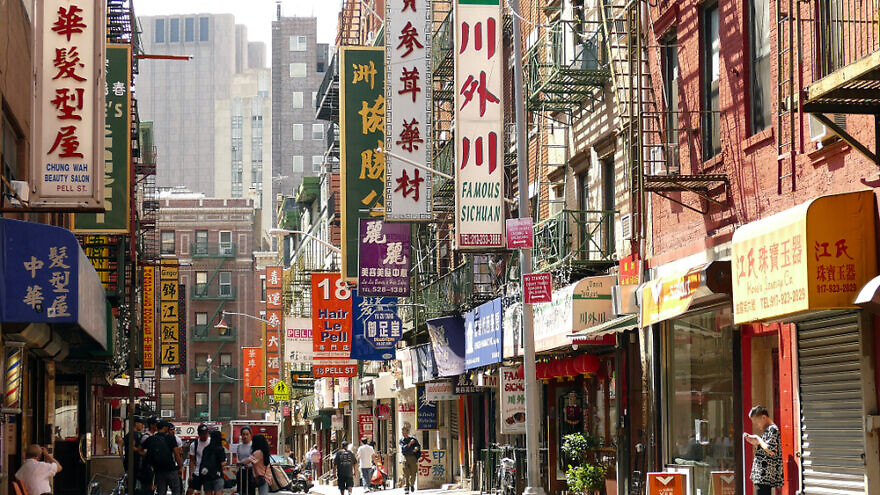On a recent evening, I was traveling on the New York subway in a car that was empty except for me, a woman and her child, and two men. As I sat down, I realized that one of the men—a young guy dressed in gym clothes with the powerful build of a mixed-martial arts fighter—was hurling ugly racial invective at the other, who appeared to be a middle-aged Chinese man and was sitting directly opposite him.
“You people are like f****** rats,” he growled. “You people are f****** poison. Dirty f****** people!” Then the first man stood up, towering over his victim. He spat at the trembling Chinese man before proceeding to kick with brute force the empty seats on either side of him.
When I later reflected on the incident, I realized that what struck me so deeply was the comparison of Chinese people to “rats” and “poison.” These are terms that Jews have been only too familiar with throughout their history, from the “blood libels” and accusations of well-poisoning of the medieval period through to the genocidal racial program of Nazi Germany. With the onset of the coronavirus, similar tropes have emerged regarding Chinese people, transforming legitimate concerns about how much China’s Communist regime knew about the origins of the virus into racist “Kung Flu”-type memes that effectively targeted anyone with an Asian appearance.
And just as there has been a surge of anti-Semitism triggered by the pandemic, so it is with racism towards Asian people. The falsehoods and accusations directed at both communities have accused them of secretly launching COVID-19 on an unsuspecting world and benefiting materially and politically from the pandemic’s spread, along with cruder messaging that the deaths of Jewish and Chinese people as a result of the virus are a welcome development.
In some cases, the results have been fatal—for example, the murder in the Atlanta area of eight people, six of them Asians, by a white-supremacist gunman in March 2021. Only last Sunday, Christina Yuna Lee—a 35-year-old Korean-American woman who was active in combating hatred towards the Asian community—was brutally stabbed to death by an intruder who followed her into her apartment building in Lower Manhattan. A few days later, an improvised memorial to Lee outside her home, featuring flowers, candles and signs condemning hatred towards Asians, was vandalized overnight. Lee’s landlord, Brian Chin, told the New York Post that he had tried to reassemble the memorial as best he could. “They try to desecrate her as much as they could, and we as a community are beyond fed up, we are beyond angry, and we are tired of being attacked,” said Chin. “We are tired of seeing this hatred, and we are not going to stand for it anymore.”
The attack on the memorial to Lee reminded me of similar outrages in Paris at the memorial to Ilan Halimi, the young French Jew kidnapped and murdered by an anti-Semitic gang in 2006. The memorial to Halimi sits in a small garden, the Jardin Ilan Halimi, that has been vandalized with anti-Semitic graffiti on several occasions since it was erected in 2015. Almost exactly a year ago, when a small crowd of French Jews gathered at the garden to commemorate the 15th anniversary of his death, the sentiments expressed by some were similar to those of Mr. Chin in New York. “There’s a feeling that it’s all been for nothing—that we’re not learning from the past,” remarked one attendee at the Halimi commemoration. Another pointed out that since Ilan Halimi was murdered, other French Jews have lost their lives in anti-Semitic attacks that range from full-scale terrorist attacks to home invasions in which the Jewish victims are robbed, beaten and occasionally killed.
And just as anti-Semitism is a global phenomenon, so is anti-Chinese and anti-Asian sentiment. In other English-speaking countries, there has been a slew of social-media postings about the “Chinese virus,” while in many Asian countries with significant Chinese minorities, such as Indonesia and Malaysia, both hate speech and racist violence have escalated during the pandemic. Equally, both communities have been vilified for their alleged “privilege” even as they suffer from hate crimes that are becoming more common and more normalized. Currently, Asian-American advocates are taking to the Supreme Court their fight with two elite colleges—Harvard University and the University of North Carolina—claiming that both discriminate against Asian-American applicants by scoring them lower in some categories while showing bias towards black and Hispanic applicants at the same time. A century ago, Jews would have told a similar story about this country’s leading academic institutions.
No two forms of prejudice are exactly alike, but whatever the historical and contextual differences between the discrimination encountered by the Jewish and Asian communities, there is no question that we need to be close allies at this point in time. At the end of January, John C. Yang, the president and executive director of the nonprofit civil-rights group Asian Americans Advancing Justice (AAJC), said explicitly that the communities he advocates for actively welcome solidarity from other groups. “The support of our allies representing diverse communities of color and diverse faith communities has meant a great deal as our Asian American communities have been under attack,” said Yang.
Such solidarity needs to intensify. The depressing reality is that in the United States in 2022, anti-Semitism and anti-Asian hatred are rising precipitously. Jews must make common cause with Asian-Americans to push back.


























